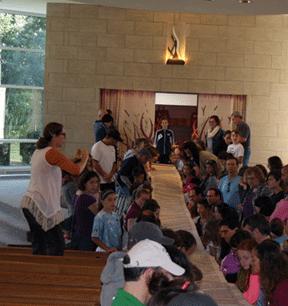
Congregation Beth Torah is one of 10 Reform congregations in North America selected to participate in the newly formed Union for Reform Judaism (URJ) Community of Practice dedicated to exploring ways of Creating Connected Communities of Families with Young Children. This URJ Community of Practice (CoP) is a congregational networking group for Reform congregations without early childhood centers that are seeking to discover new ways to engage young families in congregational life.
By participating in this initiative, Beth Torah will have the opportunity to meet with leaders from congregations with common interests to share ideas and experiment together with new strategies. {mprestriction ids="1,3"}Beth Torah will also have access to the URJ’s professional staff and expert consultants, some of the most renowned thought leaders in their fields.
Board of Trustees member Todd Davisson and Beth Torah’s Director of Community Connection Laura Intfen will co-chair this project. Congregation President Linda Zappulla mentions, “This program will build on our recent policy changes of including school tuition in our membership commitment and opening up our school to the entire Jewish community of Greater Kansas City and is part of a good wind blowing for Beth Torah as we move toward the future. We are all looking forward to the results of learning with other congregations and the URJ to help fill our halls, our school and our pews with young families.”
“Across North America, people hunger for real connections. They want — they need — to be part of meaningful communities,” said URJ President Rabbi Rick Jacobs. “The URJ communities of practice will give Reform congregations opportunities to work together, take risks, explore new ideas, innovate and have unprecedented access to top experts.”
The 10 congregations in the Creating Connected Communities of Families with Young Children Community of Practice will work together formally for 18 months to push the boundaries of existing congregational efforts, experiment in their own communities, receive peer support and guidance along the way, create congregational changes and garner skills that will benefit all areas of congregational life.
This Community of Practice will include an in-person meeting for congregational staff and lay leadership involved in the initiative at the URJ Biennial in November in Orlando, Florida, the largest Jewish gathering in North America. There also will be monthly virtual gatherings and e-learning opportunities. Finally, results of these strategic experiments will be shared with congregations outside the Community of Practice and with the Reform Movement at large.
“URJ’s Communities of Practice (CoP) inspire congregations to build the skills to experiment and innovate in areas of congregational life that are important to them. We connect congregational leaders to each other as well as to experts, valuable resources, and learning opportunities. The cohort model allows congregations to engage with a group to experiment, lowering the risk and sharing learning,” said Amy Asin, URJ Vice President of Strengthening Congregations. “From the work of previous CoP cohorts, we know that the support available in belonging to a committed group focused on areas of interest encourages congregations to delve more deeply into their work and creates a longer term commitment to build the skills for experimentation. The participants engaged in this sacred work will grapple with challenges and celebrate successes across the network. We also look forward to sharing what they learn and do with all URJ congregations.”{/mprestriction}